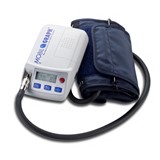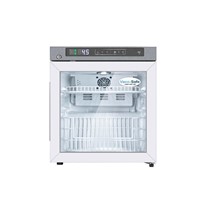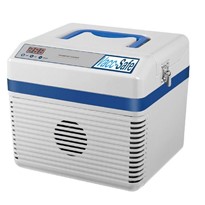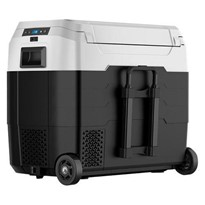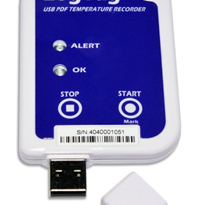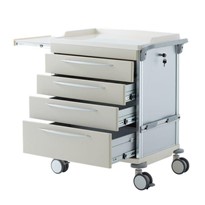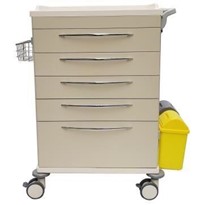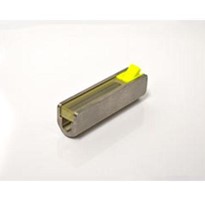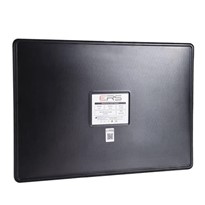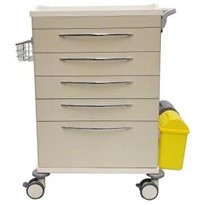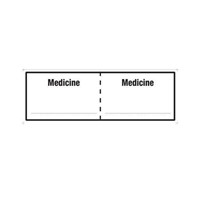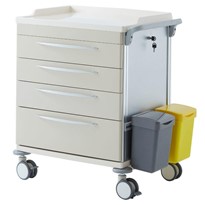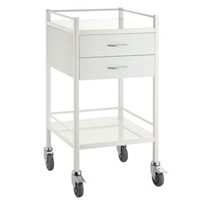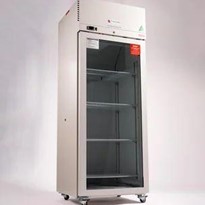If certain medicines, vaccines and biological products are stored outside the specific temperature range, and get too hot or too cold, they lose their effectiveness and potency. For a patient whose life depends on the right dosage of medication, this could have serious consequences. Whether in a medical facility or at home, it is essential to know where your medication needs to be stored, and whether it needs refrigeration. In this article we will explain if it is okay to store medicine in a refrigerator, what types of medicine need refrigeration and the type of refrigerator required.
Temperature Requirements for Medication
As a general rule, medicines must be stored in a dry place away from direct sunlight and moisture. However, many medications also require refrigeration for safe storage. These medications are temperature dependent, and must be cold chain managed. This means ensuring the temperature is maintained within the strict parameters of 2 ºC to 8 ºC. The cold chain is the term used to describe the cold conditions medications need to be kept in during storage and transportation.
Medications naturally biodegrade over time and lose potency quickly when they are stored outside the recommended temperature range. This is called a cold chain breach. The medicine will not work properly for the patient and results in wastage.
Types of Refrigeration for Medicine
All medications have special instructions for storage and often those requirements include refrigeration at strict temperatures. There are two types of fridges you can store medication in, a domestic fridge found in the home, and a purpose built medical fridge. Both of these items are designed to keep items cold and free from contamination. However, there are significant differences between the two types of fridges.
Medical fridge
The best place to store temperature sensitive medications is in a medical fridge. This is specifically designed for the purpose of storing medications that require precise and constant temperature control. Medical fridges are an essential piece of equipment found in hospitals, pharmacies, doctor’s surgeries, vets, and cosmetic clinics. In fact, healthcare facilities are not permitted to store temperature sensitive medications and biological products in anything other than a purpose-built medical fridge. Healthcare facilities must follow the protocol governed by the National vaccine storage guidelines to maintain a temperature of 2 ºC to 8 ºC to avoid medicines and vaccines being damaged or spoiled.
Dedicated medical fridges are designed with sophisticated features and technology to ensure uninterrupted temperature control for safe storage. They have power outage plans, alarms, temperature precision, data loggers, lockable doors, UPS backup battery power source, and regulatory compliance.
While medical fridges are typically found in healthcare facilities, there are some medical fridges for personal use at home. Mini fridges are ideal for home use, for medications like insulin, migraine injectable medicines, growth hormones, and chemotherapy drugs that require strict temperatures for safety. Permanent mini fridges are designed to fit in small spaces for home under a bench or in any room with a power point.
Domestic fridge
Both medical and domestic fridges are designed to keep items cold and free from contamination. However, unlike medical fridges, domestic fridges are not specifically designed for temperature sensitive medications. Domestic fridges do not have the same level of temperature control to maintain cold storage requirements, and mostly do not have external devices that display the current temperature inside the fridge.
When medications need to be refrigerated at home in a domestic fridge, the instructions will say ‘Keep refrigerated’ or ‘ Store at 2 ºC to 8 ºC’. Medications that may need storage at home for personal use include eye drops, antibiotics, and insulin. When storing medication in a domestic fridge, it is important to try and maintain a stable temperature in the fridge.
What Medicines Need Refrigeration?
Whether you are a healthcare professional or a patient, it is important to understand what medicines need refrigeration and how temperature sensitive they are. Each medication will have specific storage instructions and it is important to consult them before storing drugs in a healthcare setting or at home.
Medications for weight loss, diabetes, cancer, and even some creams and gels must be refrigerated. The following list details each category, examples of the type of drug, and reason for refrigeration.
Insulin
This is an injectable medication for the treatment of diabetes. It is very sensitive to temperature and light. There are 5 types of insulin ranging from short to long acting as insulin is classified according to how long it works in the body. Most insulin manufacturers recommend storing unopened insulin in the fridge. Insulin can deteriorate quickly when not stored in the correct conditions.
Weight loss injections
Weight loss injections require refrigeration for safe storage. These medications need to be protected from heat and are temperature sensitive drugs. To be fully effective, they must be stored within 2 ºC to 8 ºC until first use or expired.
TNF inhibitors
These are injectable medications used for treating inflammatory diseases and do not tolerate high temperatures, freezing temperatures, temperature variation, or exposure to too much light.
They must be kept refrigerated between 2°C to 8°C and can only stay at room temperature for a limited time without risking spoiling and losing efficiency.
Eye and ear drops
Many eye and ear drops need to be refrigerated to stabilise the chemical structure. They can be left out of the fridge for small periods of time but, for safety, refrigeration is best. Check the packaging to see what is recommended in terms of safe storage.
Vaccines
These are the most temperature sensitive medications. They quickly spoil if left out of strict temperature parameters. Vaccines must be refrigerated and are not to be out of the fridge for more than one hour.
Antibiotics
Not all antibiotics need to be refrigerated but some do, particularly if it is a short-term liquid. The packaging will clearly state ‘keep refrigerated’.
Migraine injections
Migraine injection drugs, classed as calcitonin gene-related peptide (CGRP) monoclonal antibodies, must be refrigerated. They require specific temperature requirements of 2°C to 8°C, and can only be out of the fridge after opening for a maximum of seven days.
Asthma inhalers
Most asthma inhalers do not require refrigeration, but there are some temperature sensitive medicines in this category that do. It is important to read the instructions on the packaging to find out storage requirements.
Growth hormones
These are available in different forms, including lyophilized powder in vials and two-chamber cartridges for reconstitution, prefilled cartridges, and prefilled pens. They must be refrigerated and can only stay out of the fridge for short periods of time.
Tablets and capsules
Generally, most tablets and capsules do not require refrigeration. However, chemotherapy and antiretroviral drugs are temperature sensitive and must be refrigerated within strict temperature guidelines.
How To Store Medications in the Fridge
Temperature should be as stable as possible for storing medications. Medical fridges guarantee this temperature stability, and have additional features like alarms, data loggers and backup battery supply. A domestic fridge at home will be less reliable, particularly for extremely temperature sensitive medications. To store medications in the fridge safely, this set of guidelines will help.
-
Do not pack the fridge without circulation.
-
Do not keep the fridge door open too long.
-
Store medication in the centre of the fridge where the temperature is more stable.
-
Do not place medication near the freezer.
-
Do not place medication outside of the load line.
-
If storing medication in a domestic fridge, make sure it is not close to food.
-
Check the temperature of the refrigerator regularly.
What Happens to Medication If Not Stored Properly?
There are significant consequences for medication that is not stored properly. Correct storage is crucial to their potency and effectiveness. Temperature sensitive medication that is not stored at the correct temperature can lose its effectiveness and potency. At worst it can become toxic. If medication is not stored properly, these are potential consequences.
-
Vaccines: As the most temperature sensitive medication, vaccines that are not stored properly will lose potency and become ineffective. Patients will not be fully protected against the disease the vaccine protects, or may experience negative side-effects from the spoiled vaccine.
-
Antibiotics: There are a few temperature sensitive antibiotics that require cold chain storage. If that is compromised, they can cause damage to the kidneys or stomach.
-
Insulin: If insulin is not refrigerated in the correct environment, it may impact the potency of the medication. The dosage will not be correct and will inhibit its ability to manage blood sugar levels.
-
Chemotherapy drugs: If not stored in the correct and precise temperature range, chemotherapy drugs will be rendered useless, and can become toxic. Patients' lives may be put at risk from not being given the correct dosage.
-
Weight loss injections: If weight loss injections are not refrigerated, over time it may become less effective or ineffective. Higher temperatures for too long damage the medication and it will not work as well.
-
Growth hormones: If growth hormones are not stored properly, they not only lose effectiveness, but may become dangerous to use.
-
TNH inhibitors: If these are not stored properly, they become ineffective. As this medication is used to help control symptoms of diseases like arthritis and Crohn's disease, patients are at risk of uncontrollable inflammation, pain and swelling.
Some medicines require refrigeration as they are temperature sensitive, and do not react well to extreme heat, cold, or even room temperature. Knowing how to store medication and the requirements of cold chain storage is essential for patient safety. Our guide explains the importance of precise temperature storage for some medicines, the medicines that require refrigeration, and ways to refrigerate medicine at home and in a healthcare setting. For further information, contact the experts in medical refrigerators, Vacc-Safe.



